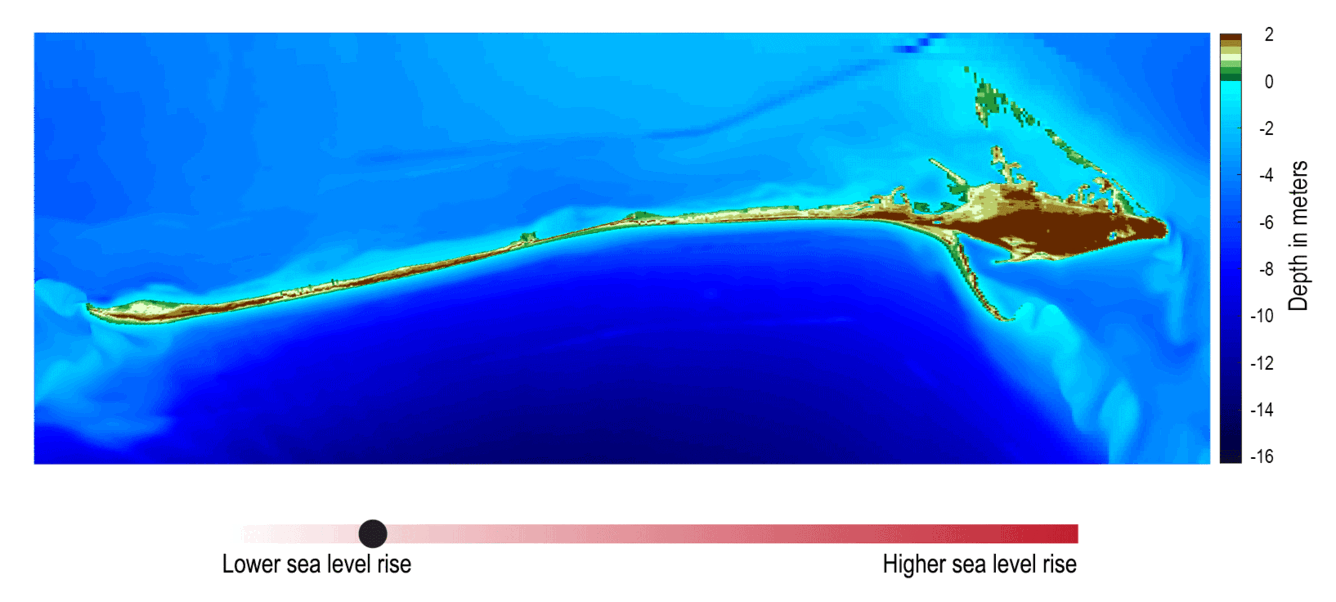USGS participates in Coastal Solutions Workshop for the Gulf Coast Keynote Focused on Science for Stakeholders
The USGS was a co-organizer with Ocean Visions for the virtual Coastal Solutions Workshop, “Coastal Flood Modeling, Prediction and Observations for the U.S. Gulf Coast,” held in April 2021. The workshop focused on resiliency challenges and opportunities facing the Gulf of Mexico.
In recent years, there has been significant progress in U.S. Gulf Coast coastal flood observations, modeling, and forecasting efforts while coastal communities are facing more frequent and severe flooding, inundation, and sea-level rise. Many of these products and observations are now designed in active partnership with local and state partners and are intended to assist community stakeholders with addressing today’s coastal flood hazards and future flooding, inundation, coastal change, and sea-level rise. The workshop organizers recognized that, “at the front lines of these impacts, it is critical that the research community’s approaches for working with coastal communities include intentional efforts to reach the entirety of our coastal populations.”
Dr. Hilary Stockdon, USGS Science Advisor for Coastal Change Hazards and Co-Executive Director of the U.S. Coastal Research Program, was invited to present the keynote address to touch upon landscape issues, coastal hazard challenges, the benefits of collaboration, and focusing on underserved communities that are most vulnerable to coastal change.
“We need to do a better job of providing the science in a meaningful way,” said Dr. Stockdon as part of her keynote address. “Understanding the people we serve is critical to the science we do.”
The workshop was a forum for assembling the Gulf Coast research community to help integrate and improve collaboration among these entities to better serve coastal stakeholders. Presentations at the workshop showcased examples of how these products are evolving to meet a range of coastal stakeholder needs for addressing contemporary and future coastal flood hazards.
Dr. Gary Mitchum, sea level rise expert and Associate Dean at the USF College of Marine Science (USF CMS), led a session aimed at exploring ways to use regional models and data to inform local decision-making. The two key speakers in this session were USGS scientist Kara Doran, a former student of Mitchum’s, and Dr. Frank Muller-Karger, another USF CMS scientist and professor.
Kara Doran presented, “USGS Forecasts of Total Water Level and Coastal Change Hazards along the U.S. Gulf Coast,” and participated in a panel discussion on current challenges with observation, modeling, and stakeholder engagement. “We seem to have a tool overload, and there is a challenge to pulling together which tools are most useful to which audiences,” said Doran. She emphasized the challenge of connecting the wealth of information available in the portal in a meaningful way with practitioners. USGS scientist Davina Passeri presented research on, “Assessing Sustainable Restoration Measures to Increase Barrier Island Resilience Through Data Collection, Integrated Modeling, and Decision Support – the Alabama Barrier Island Restoration Assessment.”
One of the goals for the workshop was to draft the terms of reference for a national task force for Coastal Solutions for Climate Adaptation and Resilience to provide a platform for ongoing collaboration, coordination, and synthesis activities. The workshop organizers also look forward to synthesizing the work and presenting it to Congress.
The Gulf Coast workshop was co-sponsored and organized by Mississippi Sea Grant, NOAA’s Integrated Ocean Observing System, Mississippi State University, USGS, The Water Institute of the Gulf, the Southeast Coastal Ocean Observing Regional Association (SECOORA), the Gulf Coast Ocean Observing System (GCOOS), California SeaGrant, and Louisiana Universities Marine Consortium (LUMCON) and was one of three in the ‘Coastal Solutions Workshop’ series.
See the full agenda and learn more: https://www.oceanvisions.org/2021-gulf-coast-solutions-workshop
Ocean Visions, Coastal Solutions
There is a disconnect between research and ocean solutions that requires breaking down the silos that exist among research universities and institutions, professional ocean-focused societies, non-governmental organizations, intergovernmental organizations, non-profit foundations, businesses, and financial institutions in order to link research, development, and deployment processes within a unified framework.
In 2019, a group of leading research and academic institutions joined together to create The Ocean Visions network, whose mission is to transform science and engineering into scalable, equitable, and sustainable ocean solutions. Ocean Visions brings together leading oceanographic research and academic institutions with private sector and public-interest organizations to design and advance solutions to the growing crisis in our ocean and climate.
The first Ocean Visions workshop, held in July 2020, focused on the east coast of the US; the second one in March 2021 focused on the west coast. The third virtual “Coastal Solutions” workshop in April 2021 focused on resiliency challenges and opportunities facing Gulf of Mexico. These workshops culminated in the Ocean Visions 2021 Summit, “Towards a Global Ecosystem for Ocean Solutions,” that was held virtually in May 2021 on the campus of Scripps Institution of Oceanography with linkages across the globe to satellite campuses.
Learn more:
https://oceanvisions.org/event/2021-global-online-summit/
https://www.oceanvisions.org/
Get Our News
These items are in the RSS feed format (Really Simple Syndication) based on categories such as topics, locations, and more. You can install and RSS reader browser extension, software, or use a third-party service to receive immediate news updates depending on the feed that you have added. If you click the feed links below, they may look strange because they are simply XML code. An RSS reader can easily read this code and push out a notification to you when something new is posted to our site.





